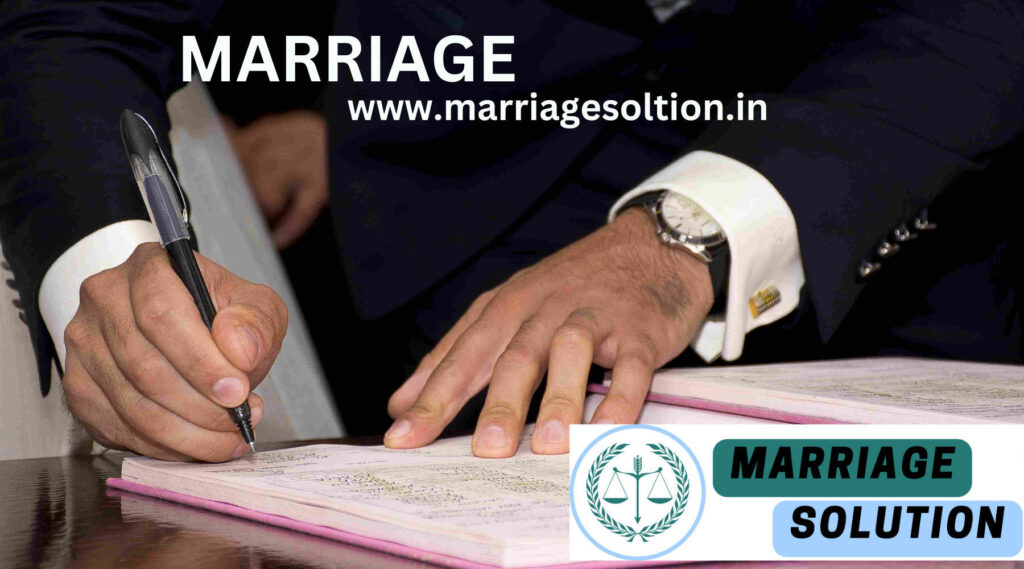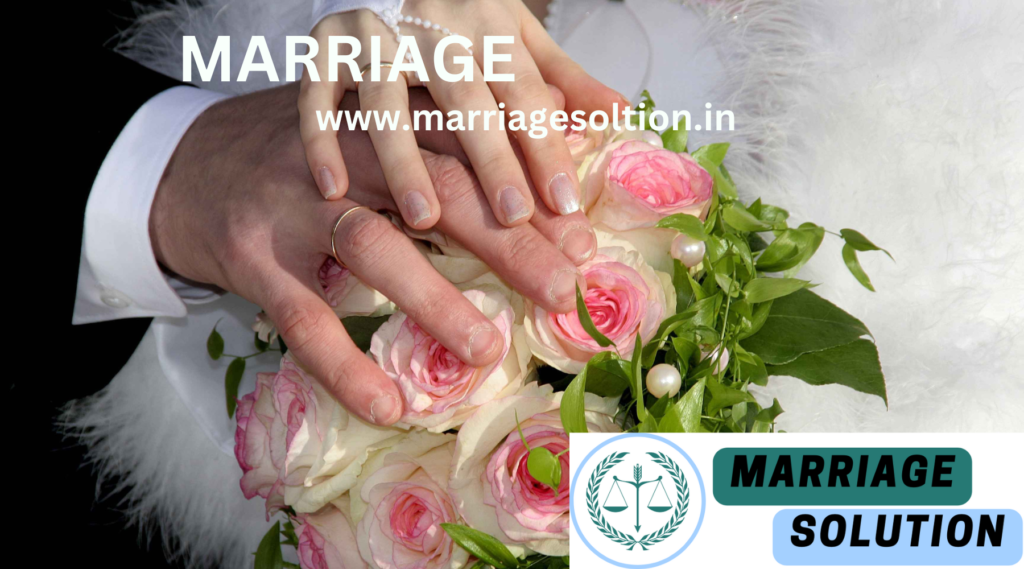Table of Contents
Introduction:
Known as civil marriage or registry marriage. It is a legal way for couples to get married without traditional religious ceremonies. Court marriage is a straightforward and efficient process that follows the law. We will cover the details of court marriage, including the steps, requirements, benefits, and frequently asked questions.

Court Marriage:
Court marriage serves as a non-religious choice for couples who desire a simple and lawful means of formalizing their relationship. It presents an option to customary or cultural observances that could entail specific rites, customs, or criteria linked with distinct religions or groups.
Choosing a court marriage guarantees the legal validity and recognition of couples’ union by the state, enabling them to define their marital duties and rights in compliance with legal regulations.
To undergo court marriage, the usual procedure entails submitting an application to either the concerned marriage registrar’s office or appropriate court. The applicants must furnish mandatory documents comprising identity proof, birth certificates, address proofs and photographs. Besides these general mandates, they may also have to comply with age prerequisites or eligibility criteria as notified by their jurisdiction along with furnishing any specific documentation required for this purpose.
After submission and verification of the application, a specific date is allocated for conducting the marriage ceremony in court. On that day, both partners accompanied with witnesses attend court to formalize their union in front of a marriage registrar. The Registrar ensures adherence to all legal requirements including recording signatures on the Marriage Register as well as issuance of an official Marriage Certificate following completion.
The simplicity and efficiency of court marriage is a major benefit, as it saves time by eliminating elaborate preparations, religious customs or cultural ceremonies. This option can be particularly advantageous for couples who prefer a straightforward legal process. Beyond this convenience factor, court weddings also offer married partners with valuable legal protection rights and benefits such as inheritance rights social security benefits recognition in official government records; these are highly desirable privileges that enhance the quality of life together.
court marriage process :
Step 1: To begin the court marriage process, Step 1 involves presenting a Notice of Intended Marriage to the designated registrar. Personal information including names, addresses, dates of birth and professions need to be completed on the appropriate form by both parties involved. The duration for which this notice must stand varies depending upon jurisdiction but generally ranges from 30-60 days.
Step 2: After the notice of intended marriage is received, the couple’s information is verified by the marriage registrar in step two. The eligibility of both parties and any possible legal impediments to their union are thoroughly checked. Once confirmed, an announcement regarding their intention to marry will be made public at either a district or marriage office for review; this allows anyone with objections or concerns about potential issues to raise them before proceeding further.
After the notice period has ended and no objections have been raised, couples can move on to
Step 3: Marriage Registration. They must present themselves before the marriage registrar with two witnesses who need to provide their identity as well as address proof. The ceremony is then solemnized by performing legal formalities such as exchanging vows and signing a register; this results in the issuance of a marriage certificate that acts as evidence of their union.
1.Wedding Intention Affidavit :
The initiation of the court wedding procedure necessitates that the couple provides a written notification expressing their desire to get married at the office of the Marriage Registrar. The said notice must bear vital details, including names, residential addresses, age range, matrimony status and nationalities of both individuals. Additionally, they should submit it in an area where either or both parties have lived for no less than 30 consecutive days before filing date.
2.Period for Objections:
Individuals are allowed to voice their concerns with the Marriage Registrar within 30 days before the wedding, if they have legitimate reasons for objecting. Such objections could be based on legal obstructions like an existing legally-binding prior marriage, forbidden family connections or any other sufficient enough grounds that would act as a barrier preventing the occurrence of such nuptials.
3.Review of Objections:
In the event of any raised objections, the Marriage Registrar conducts a rigorous examination to ascertain their validity and pertinence. In so doing, the Registrar evaluates whether such oppositions have a legal basis while also determining if they possess enough weightage to interrupt or prevent further marriage proceedings. Such scrutiny guarantees that all requirements are satisfied legally and endeavours to protect everyone’s rights and welfare involved in this process.

4.Granting of Marriage Certificate:
The Marriage Registrar may issue the Marriage Certificate if no objections are raised within 30 days of notice, or if any objections raised have been resolved and deemed insignificant. The couple must pay a designated fee for the issuance of their certificate.
5.Timeframe for Certificate Issuance::
Ordinarily, issuance of the Marriage Certificate occurs not later than a month after providing notice. This period is essential for the Marriage Registrar to carry out vital administrative formalities, authenticate the validity of such union and ensure adherence with all legal stipulations. The certificate serves as authorized substantiation affirming legitimacy and acceptance of that wedding arrangement.
If you require assistance with court or any other Cases.
court or any other marriage-related issues, our Home – MarriageSolution.in: Your Trusted Partner in Family Legal Matters. Law Services, IPC Section blog, Expert Advice, court cases lawyer help. website may prove helpful. By completing our enquiry form and submitting it online, we can provide customized guidance to navigate through the process effectively. Don’t hesitate to contact us for personalized solutions; we are here to assist you whenever necessary!.
How do we initiate the court marriage process?
The process begins with applying for a marriage license from the local marriage registrar. The application form, along with necessary documents, needs to be submitted to the registrar’s office.
Is there a waiting period for court marriage?
The waiting period varies depending on the jurisdiction, but typically there is a 30-day notice period after submitting the application before the marriage can be solemnized.
What happens after the notice period?
After the notice period expires and no objections are raised, the marriage registrar schedules a date for solemnization of the marriage.
Is the court marriage legally binding?
Yes, once the marriage is solemnized in accordance with the law, it is legally binding and recognized throughout India.
Is there a specific age requirement for court marriage?
Yes, both parties must fulfill the legal age requirement for marriage, which is 18 years for the bride and 21 years for the groom, as per the Special Marriage Act, 1954
Can individuals from different religions opt for court marriage?
Yes, court marriage provides a secular option for individuals from different religions or those opting for an interfaith marriage, as it does not require adherence to specific religious rituals or customs
